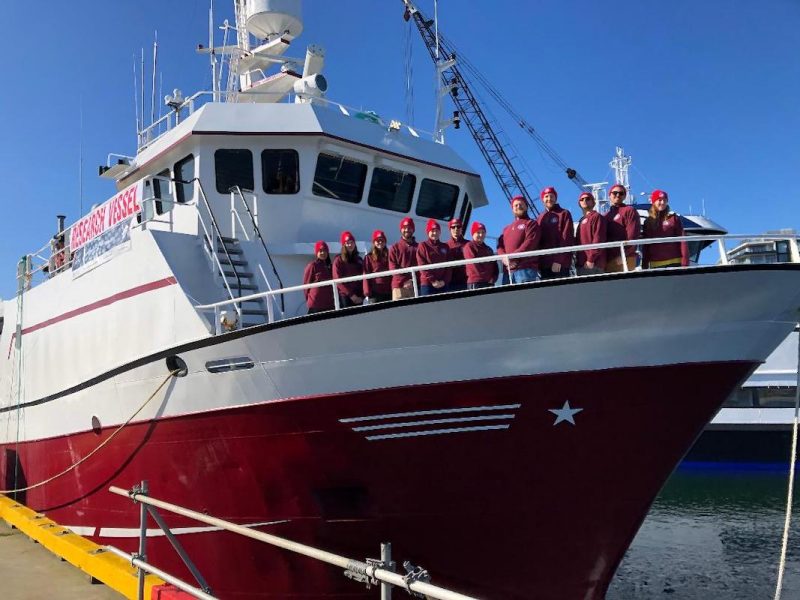Salmon sleuths set sail again to study secrets of the sea
“The research conducted on this ship offers hope and promise to all who are concerned about wild salmon”
By Fabian Dawson
SeaWestNews
A dozen scientists from Canada, U.S. and Russia set sail today from Vancouver Island for the Gulf of Alaska on a ship full of ‘hope and promise to all who are concerned about wild salmon.’
The team of international aquatic explorers, aboard the Canadian charter vessel Pacific Legacy, will for the next several weeks study the winter ecology of Pacific salmon in the Gulf of Alaska.
The research is expected to help better forecast and manage salmon populations in a rapidly changing environment.
This is the second such expedition under the banner of the International Year of the Salmon (IYS) – a five-year initiative to establish the resilience of salmon and people in a changing world.
The first International Gulf of Alaska Expedition was conducted in 2019 where scientists spent over a month travelling 8,000 kilometres in the Pacific Northwest and established there are more salmon in the Pacific Ocean than at any time since 1925.
“Healthy pacific salmon populations are key to coastal communities and the culture and history of Indigenous peoples, and the research conducted on this ship offers hope and promise to all who are concerned about wild salmon,” said Lana Popham, B.C.’s Minister of Agriculture.
“As scientists from around the Pacific begin to fill the knowledge gaps we have around salmon lifecycles and journeys, we can develop corresponding policies and programs that support future generations of both wild fisheries and British Columbians,” she said, prior to the ship’s departure.
John Paul Fraser, the executive director of the B.C. Salmon Farmers Association (BCSFA) said missions such as this expedition and the one before that can help scientists better understand how changing environmental conditions in the ocean impact wild stocks.

“It’s all about making the future better… We are all salmon people and we have a great interest in solutions,” said Fraser, whose industry association has pumped in about $275,000 for the expeditions, including $50,000 for this year’s journey.
The expeditions are privately organized by Fisheries and Oceans Canada scientist emeritus Dr. Richard Beamish and Dr. Brian Riddell, Science Advisor for Pacific Salmon Foundation.
The Pacific Salmon Foundation in conjunction with its Salish Sea Marine Survival Program, and the British Columbia Salmon Innovation and Restoration Fund (BC SRIF) are also contributors to the expeditions.
“In addition to successfully completing the first-ever on-board stock assessment of the environmental DNA of salmon, the 2019 expedition made a number of discoveries that will allow us to be effective stewards of Pacific salmon in a future of changing ecosystems,” said Mark Saunders, IYS Director for the North Pacific Region.
“The 2020 Gulf of Alaska expedition will build on this research,” he said.
“The expedition last year and this year will provide new understandings of the mechanisms regulating the abundance of salmon after they enter the ocean,” said Dr. Beamish.
“The baker’s dozen of enthusiastic international aquatic explorers who have volunteered to be on this second expedition will make discoveries that will eventually change how we manage salmon in British Columbia and the North Pacific,” he said.
“Last year’s expedition teased us with the unexpected and the exciting, but we don’t learn from one observation,” said Dr. Riddell.
“The 2020 expedition begins our learning process and, hopefully, to further explain recent declines in BC’s Pacific Salmon production,” he said.
Meanwhile, a new Simon Fraser University-led study looking at the effects that glacier retreat will have on western North American Pacific salmon predicts that while some salmon populations may struggle, others may benefit.
The research, published in the journal BioScience, examined the multiple ways in which salmon might be affected by climate-change driven glacier retreat over the coming decades. The researchers predict that in southern watersheds the loss of cold glacier meltwater during summer months could lead to low water flows and warmer water temperatures, both challenges for adult and young salmon.
However, in more northern watersheds, glacier retreat may create new salmon habitat.
Eighty-five per cent of major salmon watersheds or regions in western North America currently have at least some glacier coverage.
Glaciers in this region are expected to lose up to eighty per cent of their ice volume by the year 2100, with significant implications for salmon habitat availability, water flows, and water temperatures.
The authors cautioned that glacier retreat is adding one more pressure on salmon systems that are already stressed by climate change, habitat destruction, and hatchery practices that erode salmon biodiversity.
MAIN IMAGE – Gulf of Alaska Expedition scientists aboard the Canadian charter vessel Pacific Legacy

